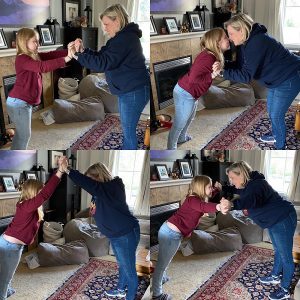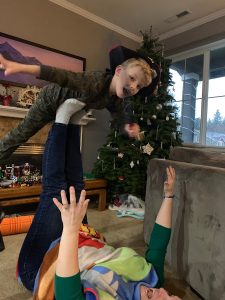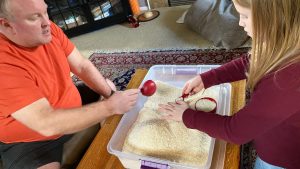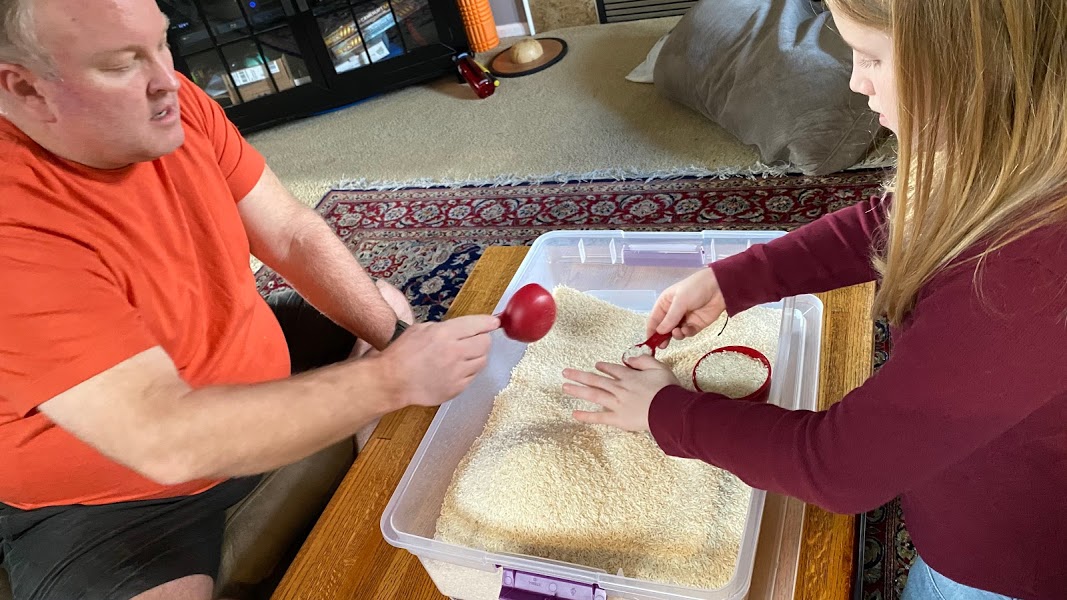It may sound counterintuitive but after 10 months of quarantine, uncertainty and virtual schooling, Olympia therapist Cary Hamilton has some advice for parents: stop talking. It’s not that talking with your kids is inherently problematic, she explains. The challenge is when parents’ words and actions are not congruent, particularly when it comes to reducing stress and managing anxiety. Kids are observant and they notice when what we’re saying doesn’t line up with what we’re doing.

“When you tell them, ‘Let’s take a moment to breathe’ or ‘Let’s sit down and talk it out,’ we get these explosive behaviors,” Hamilton explains, “because kids are seeing every day how that isn’t working for their parents and so they lose trust.” Hamilton is the founder and owner of Olympia Therapy and Playful Wisdom Parenting.
Winter is presenting added challenges, given the gray weather and shortened days in the Pacific Northwest. With the holiday season concluded, the next event families can look forward to may feel too far away. “We’re in a slump,” says Hamilton. “Spring break isn’t for months and there’s nothing for people to be holding on for except for maybe being able to go back to school, but that’s also uncertain.”
Under normal circumstances, parents can rally their children’s intrinsic motivation but at this point, the supply is low for everyone. She’s seeing families heading toward opposite extremes to cope; some parents are becoming increasingly authoritarian while others appear to have abandoned any attempt at maintaining routines. Kids are expressing their anxiety in a variety of ways, such as extreme perfectionism, obsessive-compulsive behavior, negative self-talk and refusing to go outside or even get out of bed. “We’re seeing a lot more sedentary behavior,” says Hamilton.

As the pandemic drags on, she has been offering different tools to help families cope with an ambiguous future.
Get Moving. The first involves more movement, less talking. This approach emphasizes changing physiology to impact neurochemistry or, more simply, the body before the brain. “Kids just need to feel connected,” she says. “Any activity that is physical and increases connection can challenge the depressive hormones that are currently overrunning the system.”
Examples include playing ‘rowboat’ with your feet together, rolling a ball across the floor to each other, bouncing on a ball and other push/pull activities. The important thing is that kids perform these activities with an older person in their life, whether that’s a teenaged babysitter, a grandparent, parent, or aunt/uncle. The other key? Not talking, at least not about anything substantial.
Create opportunities to laugh together. Physical games and activities are even more beneficial when they result in laughter. Multiple studies have shown that laughter makes it easier to cope with difficult situations, increases connection to others, improves mood, and lessens depression and anxiety. “Laughter and joy are a protective mechanism,” says Hamilton. “They don’t just feel good in the moment, they have impact over the long term.”

When families engage in tickle monster or other games that allow them to be silly together, like air hockey or group jump rope, it’s a chance for everyone to blow off steam. For parents, it’s also an opportunity to model behavior. “Jumping rope as a family means you have to work together and communicate,” says Hamilton. “If it’s not working, it’s important for parents to laugh and say, ‘We tried something new.’”
Give each other space. After so much time together, most families are ready for some time away but for most of us, there is nowhere to go. Make quiet time a priority, Hamilton advises. Create spaces where kids can listen to audible books in their room or spend time coloring. “It’s not having a place away from others is starting to agitate us,” she says. “Adults need it too. Nighttime is not sufficient. We need to model that it’s okay to slow down, read a book and chill out from each other.”
Maintain structure and routine. Finally, maintaining as much structure as possible at home is critical, especially as schools begin to re-open. Keeping bedtimes and waking up times the same and developing daily routines will help kids adjust when they return to campus. “It’s only a month before some schools might be opening,” Hamilton notes. “Kids need those anchor routines in place now to give them something to hold onto once they’re back.”

Once schools re-open, she anticipates other challenges because students will finally feel safe in a predictable environment. “They’re going to be expressing themselves because they’ll feel safe to do so,” she explains. “If we don’t encourage them to be regulated and calm now, the classroom is going to be even more difficult emotionally. The best thing we can do for them is teach them how to regulate themselves.”
Learn more by visiting the Olympia Therapy website or Playful Wisdom or calling 360.357.2370.
Sponsored




















































